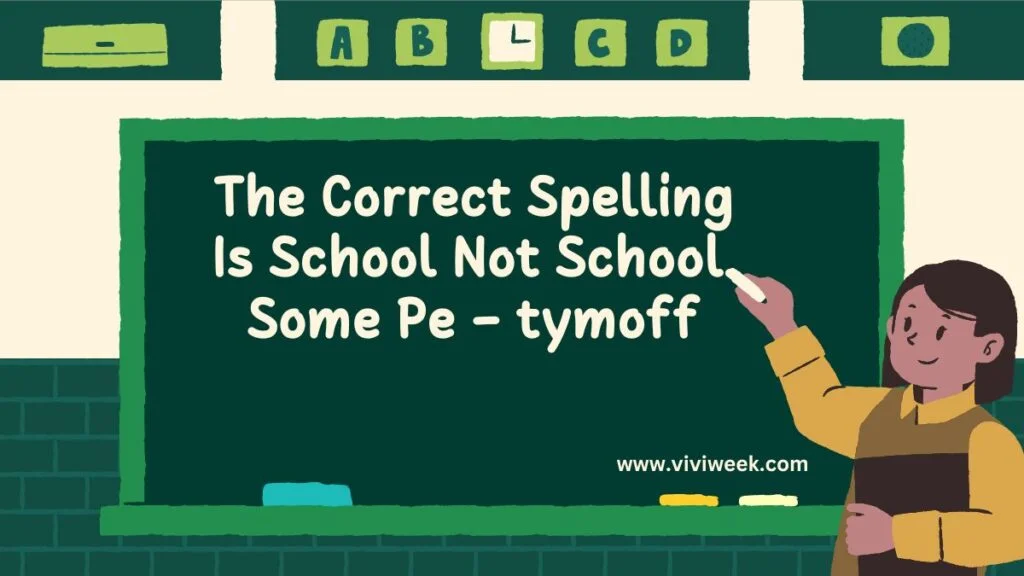The correct spelling is school not school. some pe – tymoff In today’s fast-paced world, the precision of spelling often seems like a minor detail, yet it plays a crucial role in effective communication. While texting and social media have popularized informal spellings, it’s essential to understand why proper spelling still matters. One such common confusion is between “school” and “skool,” a topic that highlights the broader implications of spelling choices. This article delves into why “school” is the correct spelling and explores the impacts of spelling accuracy on communication, education, and professionalism.
The Basics of Spelling
The correct spelling is school not school. some pe – tymoff Spelling is more than just a way to write words; it reflects the structure and rules of a language. Proper spelling ensures that the meaning of words is communicated clearly and accurately. English spelling has evolved significantly from its Old English roots, influenced by Latin, French, and Germanic languages. This historical evolution has led to a complex set of spelling rules, some of which have exceptions. Understanding these rules helps in grasping why certain words are spelled the way they are and aids in maintaining consistency in written communication.
The correct spelling is school not school. some pe – tymoff Effective spelling is crucial as it prevents misunderstandings and ensures clarity. For instance, misspelled words can alter the intended message or create confusion. Proper spelling enhances professionalism and credibility, whether in academic settings, professional environments, or personal communication. By mastering spelling rules, individuals can improve their writing quality and avoid the pitfalls of miscommunication.
The Term “School”
The correct spelling is school not school. some pe – tymoff The word “school” is derived from the Greek word “scholē,” which means leisure or study. Over time, it evolved through Latin (“schola”) and Old English (“scol”). In modern English, “school” refers to an institution for educating children, a place where learning and teaching occur. This term also encompasses a broad range of educational contexts, from elementary schools to universities and vocational training centers.
“School” is used in various phrases and contexts, such as “school bus,” “school teacher,” and “schoolyard,” reflecting its significance in our daily lives. It also has derivatives like “schooling” (the process of education) and “schoolhouse” (a building used for schooling). The consistent spelling of “school” maintains clarity and ensures that the term is universally understood in its educational context.
The Term “Skool”
The correct spelling is school not school. some pe – tymoff “Skool” is an alternative spelling of “school” often used in informal contexts, such as in texting, social media, or stylistic choices. This variation is primarily popular among younger audiences or in specific subcultures aiming for a casual or playful tone. The spelling “skool” reflects a phonetic representation rather than adhering to traditional spelling rules.
The correct spelling is school not school. some pe – tymoff The use of “skool” can sometimes cause confusion or be perceived as a lack of professionalism. While it may be acceptable in informal or creative writing, relying on it in formal communication can undermine clarity and credibility. Understanding when and how to use “skool” appropriately helps maintain a balance between creativity and adherence to standard spelling conventions.
Spelling Rules and Guidelines
The correct spelling is school not school. some pe – tymoff English spelling rules are designed to standardize how words are written, ensuring consistency across various texts. Basic spelling rules include adhering to patterns like doubling consonants before adding suffixes (e.g., “running” from “run”) and changing “y” to “i” before adding suffixes (e.g., “happier” from “happy”). However, English is rife with exceptions, such as “said” or “have,” which don’t follow the typical rules.
The correct spelling is school not school. some pe – tymoff Phonetic spelling, where words are spelled as they sound, contrasts with traditional spelling rules, which often preserve historical or etymological patterns. For example, the word “knight” is spelled differently from its pronunciation due to historical influences. Recognizing the differences between phonetic and traditional spelling helps in understanding why certain words are spelled the way they are, and it aids in mastering the complexities of English spelling.
The Importance of Correct Spelling
The correct spelling is school not school. some pe – tymoff Correct spelling is crucial for educational achievement as it directly impacts reading comprehension and writing skills. Students who master spelling rules are better equipped to excel in exams and assignments. Spelling also plays a significant role in professional settings, where correct spelling reflects attention to detail and professionalism. In job applications, reports, and official documents, accurate spelling enhances credibility and reduces the risk of misunderstandings.
The correct spelling is school not school. some pe – tymoff Personal perception is also influenced by spelling. Consistent and correct spelling in communication portrays an individual as meticulous and reliable. Conversely, frequent spelling errors can lead to negative impressions or misunderstandings. Thus, prioritizing accurate spelling in all forms of communication is essential for maintaining a positive image and ensuring effective interactions.
Common Misspellings and Confusions
The correct spelling is school not school. some pe – tymoff The confusion between “school” and “skool” highlights a broader issue of common misspellings in English. Words like “their” vs. “there” or “affect” vs. “effect” often trip people up. These mistakes can arise from similar-sounding words, phonetic similarities, or simple oversight. To avoid these errors, it’s crucial to understand the context in which a word is used and to familiarize oneself with commonly confused words.
Tips for avoiding spelling mistakes include proofreading written work, using spell-check tools, and learning common spelling rules and exceptions. Engaging in regular reading and writing practice also helps reinforce correct spelling habits. By developing these practices, individuals can improve their spelling accuracy and enhance their overall communication skills.
The Role of Technology in Spelling
The correct spelling is school not school. some pe – tymoff Technology plays a significant role in modern spelling practices. Spell checkers, integrated into word processors and browsers, help catch spelling errors and suggest corrections. While these tools are helpful, they are not infallible and can sometimes overlook context-specific mistakes or suggest incorrect replacements. Thus, relying solely on spell checkers is not advisable; understanding spelling rules and manually reviewing text remains important.
The correct spelling is school not school. some pe – tymoff Auto-correct features on smartphones and tablets also impact spelling. These features often correct misspelled words but can sometimes introduce errors or misunderstandings due to their predictive nature. Educational apps designed to improve spelling skills provide interactive ways to learn and practice spelling, offering exercises and games that can reinforce correct spelling in a more engaging manner.
Teaching Spelling: Strategies and Tips
Effective spelling instruction is essential for developing strong language skills in children. Techniques such as phonics-based approaches, where children learn the relationship between letters and sounds, and spelling games can make learning enjoyable and effective. Regular practice and exposure to new words through reading also contribute to better spelling skills.
For adults, improving spelling involves continuous practice and learning. Strategies include reviewing commonly misspelled words, utilizing spelling apps, and engaging in writing exercises that focus on spelling accuracy. Resources like dictionaries, spelling guides, and online tools can provide additional support and reinforce learning. By adopting these strategies, individuals can enhance their spelling skills at any stage of life.
Spelling in Different Languages
Spelling rules vary significantly across languages. For instance, languages like Spanish and Italian have more phonetic spelling systems, where words are spelled as they sound. In contrast, English spelling often includes historical influences and irregularities. Understanding these differences can offer insights into why English spelling is more complex and can help in learning and teaching spelling in other languages.
English has also been influenced by other languages, affecting its spelling patterns. Words borrowed from French, Latin, and other languages may retain their original spelling conventions, contributing to the irregularities in English spelling. Exploring these influences provides a broader understanding of why English spelling is the way it is and highlights the language’s rich historical tapestry.
The Future of Spelling
Language is continually evolving, and spelling is no exception. Modern communication trends, such as texting and social media, have introduced new spellings and abbreviations, which may influence future spelling norms. While these changes can make language more dynamic, they also raise questions about the balance between innovation and tradition in spelling.
The impact of digital communication on spelling includes the rise of informal spellings and autocorrect features. Experts predict that English spelling may continue to evolve, reflecting changes in technology and communication practices. Staying informed about these trends and understanding their implications can help individuals adapt to future changes in spelling and maintain effective communication.
Conclusion
In summary, understanding and adhering to the correct spelling of words like “school” versus “skool” is more than a trivial detail; it is a fundamental aspect of clear and effective communication. Correct spelling reflects professionalism, clarity, and attention to detail, which are essential in educational, professional, and personal contexts. By mastering spelling rules, using technology wisely, and practicing regularly, individuals can enhance their communication skills and avoid common pitfalls.
FAQs
1. Why is “school” spelled with two “o”s and not “skool”?
“School” is spelled with two “o”s due to its historical roots in Greek and Latin, where it evolved from “scholē” and “schola.” This traditional spelling maintains consistency and aligns with historical spelling conventions, unlike the phonetic spelling “skool.”
2. Can using “skool” affect my professional image?
Yes, using “skool” in professional contexts can undermine your credibility and professionalism. It’s important to use standard spelling in formal communication to ensure clarity and maintain a professional image.
3. What are some common spelling mistakes similar to “school” and “skool”?
Common spelling mistakes include “their” vs. “there,” “affect” vs. “effect,” and “your” vs. “you’re.” These errors often stem from similar sounds or phonetic confusion.
4. How can I improve my spelling skills effectively?
Improving spelling skills involves regular practice, using spelling apps, reading extensively, and reviewing commonly misspelled words. Engaging in spelling exercises and seeking feedback can also help.
Read More: Meet the iconic couple from the woodstock album co – tymoff










